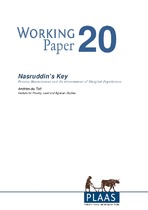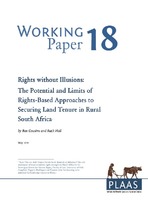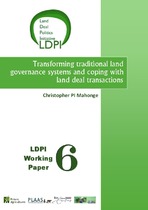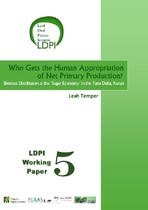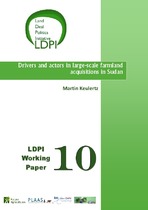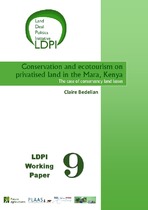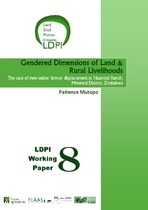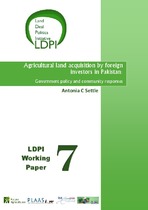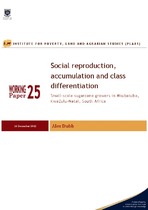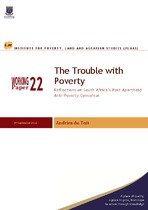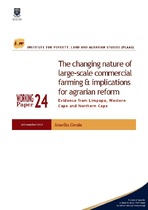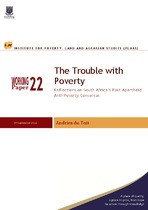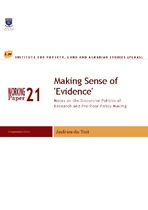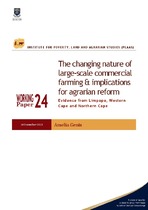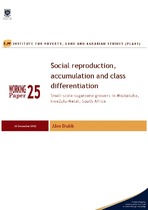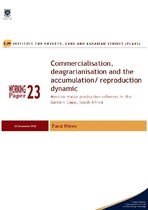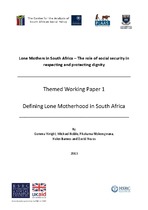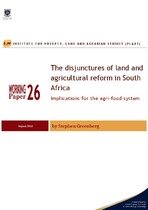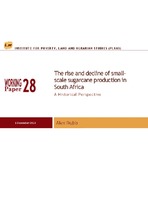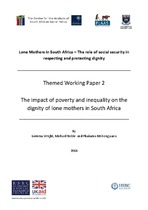Browsing Working Papers by Issue Date
Now showing items 21-40 of 79
-
Nasruddin's key: poverty measurement and the government of marginal populations
(Institute for Poverty, Land and Agrarian Studies, University of the Western Cape., 2011)This paper considers the role of ‘measurement’ and other forms of poverty knowledge in a context where the nature and direction of global economic growth is creating ‘surplus populations’ suffering various forms of ... -
Rights without illusions: The potential and limits of rights-based approaches to securing land tenure in rural South Africa
(Institute for Poverty, Land and Agrarian Studies, University of the Western Cape, 2011-05)Summarising the trajectory of tenure policy and law making from 1994 through to the present, the paper shows how discourses of rights, citizenship and democracy shape policies and legislation. We assess the policies and ... -
Transforming traditional land governance systems and coping with land deal transactions
(Institute for Poverty, Land and Agrarian Studies, University of the Western Cape, 2012)This study aimed to gain insight into how land deals have affected traditional Tanzanian land-based interactions and networks, and what coping mechanisms those affected have deployed. Case studies of land deal transactions ... -
Who gets the human appropriation of net primary production?: Biomass distribution & the ‘sugar economy’ in the Tana Delta, Kenya
(Institute for Poverty, Land and Agrarian Studies, University of the Western Cape, 2012)In this article we focus on the connection between purchases of land and the emerging ‘biomass-economy’, analysing biomass distribution in a region targeted for land-grabbing in order to understand the process from both ... -
Drivers and actors in large-scale farmland acquisitions in Sudan
(Institute for Poverty, Land and Agrarian Studies, University of the Western Cape, 2012)This study analyses the political, economic and social impacts of the land and ‘virtual water’ grab in Southern Sudan. The ‘virtual water’ concept, which explains the absence of water wars through water embedded in ... -
Conservation and ecotourism on privatised land in the Mara, Kenya: The case of conservancy land leases
(Institute for Poverty, Land and Agrarian Studies, University of the Western Cape, 2012)This paper investigates private sector investment in conservation and ecotourism through conservancy land leases in the Mara region of Kenya. In a recent and growing tourism development, groups of Maasai landowners are ... -
Gendered dimensions of land and rural livelihoods: The case of new settler farmer displacement at Nuanetsi Ranch, Mwenezi District, Zimbabwe
(Institute for Poverty, Land and Agrarian Studies, University of the Western Cape, 2012)Nuanetsi Ranch had been invaded by villagers from different parts of Mwenezi, Chiredzi and Chivi communal areas since 2000. In February 2010, the government announced that the settlers had to be removed and resettled in ... -
Agricultural land acquisition by foreign investors in Pakistan: Government policy and community responses
(Institute for Poverty, Land and Agrarian Studies, University of the Western Cape, 2012)This paper explores the Pakistani government’s 2009 agricultural investment policy package — a response to increasing foreign investor interest in agricultural land — and considers the likely implications for local communities. ... -
Social reproduction, accumulation and class differentiation: small-scale sugarcane growers in Mtubatuba, KwaZulu-Natal, South Africa
(PLAAS, University of the Western Cape, 2012)This paper argues that the rise and decline of small-scale sugarcane grower (SSG) production in KwaZulu-Natal must be historically located within a changing structural relationship with miller-processors, in turn conditioned ... -
The trouble with poverty: reflections on South Africa's post-apartheid anti-poverty consensus
(PLAAS, University of the Western Cape, 2012)This paper considers the state of poverty discourse in South Africa since 1994: the ideological frameworks, narratives and assumptions that have shaped the construction of poverty as an object of academic knowledge, ... -
The changing nature of large-scale commercial farming & implications for agrarian reform: evidence from Limpopo, Western Cape and Northern Cape
(PLAAS, University of the Western Cape, 2012)The privileged position of white commercial farmers in South Africa came to an end by the early 1990s, when political and policy changes removed the certainty provided by controlled marketing, protective tariffs and ... -
The trouble with poverty: Reflections on South Africa’s post-apartheid anti-poverty consensus
(Institute for Poverty, Land and Agrarian Studies, University of the Western Cape, 2012-09)This paper considers the state of poverty discourse in South Africa since 1994: the ideological frameworks, narratives and assumptions that have shaped the construction of poverty as an object of academic knowledge, ... -
Making sense of 'evidence': Notes on the discursive politics of research and pro-poor policy making
(Institute for Poverty, Land and Agrarian Studies, University of the Western Cape, 2012-09)This paper explores some of the assumptions underlying ‘evidence based’ approaches to poverty reduction impact assessment. It argues that the discourse of Evidence-Based Policy (EBP) offers poor guidance to those who ... -
The changing nature of large-scale commercial farming & implications for agrarian reform: Evidence from Limpopo, Western Cape and Northern Cape
(Institute for Poverty, Land and Agrarian Studies, University of the Western Cape, 2012-12)The privileged position of white commercial farmers in South Africa came to an end by the early 1990s, when political and policy changes removed the certainty provided by controlled marketing, protective tariffs and weak ... -
Social reproduction, accumulation and class differentiation: Small-scale sugarcane growers in Mtubatuba, KwaZulu-Natal, South Africa
(Institute for Poverty, Land and Agrarian Studies, University of the Western Cape, 2012-12)This paper argues that the rise and decline of small-scale sugarcane grower (SSG) production in KwaZulu-Natal must be historically located within a changing structural relationship with miller-processors, in turn conditioned ... -
Commercialisation, deagrarianisation and the accumulation/reproduction dynamic: Massive maize production schemes in the Eastern Cape, South Africa
(Institute for Poverty, Land and Agrarian Studies, University of the Western Cape, 2012-12)The post-apartheid era has seen the South African government trying to reverse ‘deagrarianisation’ in the former homelands by introducing ‘modern’ farming techniques and agribusiness principles. This paper situates the ... -
Defining Lone Motherhood in South Africa
(Institute for Poverty Land and Agrarian Studies (PLAAS), 2013)The purpose of this document is to define the group of people whom we are considering as part of the project ‘Lone Mothers in South Africa: The role of social security in respecting and protecting dignity’. Setting to one ... -
The disjunctures of land and agricultural reform in South Africa: Implications for the agri-food system
(Institute for Poverty, Land and Agrarian Studies, University of the Western Cape, 2013-08)Land reform was introduced in South Africa in the 1990s to redress the injustices of colonialism and apartheid. But compromises in the transition to democracy saw a trade-off between political participation on one side ... -
The rise and decline of smallscale sugarcane production in South Africa: A historical perspective
(Institute for Poverty, Land and Agrarian Studies, University of the Western Cape, 2013-12)South Africa’s sugar industry has long been distinguished by its large number of small-scale sugarcane growers (SSGs) farming on ‘communal’ land and its peculiar, privately administered regulatory structure. In recent ... -
The impact of poverty and inequality on the dignity of lone mothers in South Africa
(Institute for Poverty Land and Agrarian Studies (PLAAS), 2014)In Part 1 of this themed working paper, an account is provided of low income lone mothers’ portrayals of dignity in relation to their lives. A key objective of the project was to explore what ‘dignity’ means to low income ...

